At 3:00 PM, the French Prime Minister addressed the National Assembly to discuss the country's financial situation, but failed to secure a vote of confidence. The Bayrou government has fallen; the Prime Minister will resign tomorrow morning at 8:00 AM.
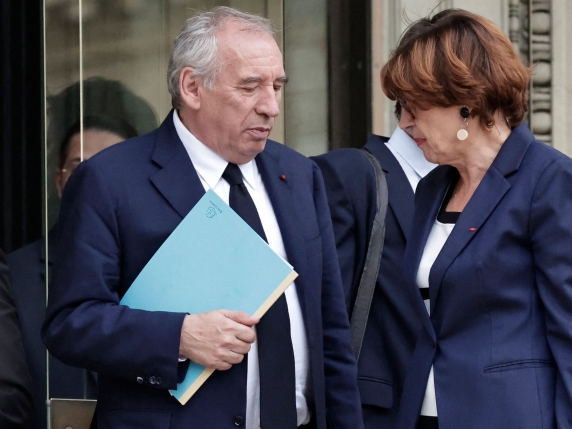
- At 3 pm the French Prime Minister addressed the National Assembly to discuss the country's financial situation and ask for a vote of confidence in his government
- At 7 pm the results of the vote came in: the French National Assembly voted by 364 votes to 194 to remove the Prime Minister from office and bring down his minority government. Tomorrow morning, Bayrou will go to tender his resignation to Macron, who will appoint his successor in the next few days. He was the first prime minister to leave power due to a vote of no confidence he himself requested. Why France is on the brink of bankruptcy: the debt, the political crisis, the spread, what is happening. 8:22 PM | September 8
The Green leader asks Macron to meet with the left
French Ecologists leader Marine Tondelier is asking President Emmanuel Macron to meet with the leaders of left-wing parties, together or separately, before appointing the next prime minister."I ask him to meet us before any speech, before any decision," Tondelier explained to BFMTV, specifying that she has agreed to be received alone or with colleagues from the Nouveau Front Populaire, with or without Jean-Luc Mélenchon, as she wishes.
7.39pm | 08 September
Macron will name his successor in the coming days
Emmanuel Macron acknowledges the fall of François Bayrou—which he confessed during the Assembly's vote of confidence—and will appoint his successor in the coming days, the Elysée announced.
19:12 | 08 September
What will happen now?
(by Stefano Montefiori) The government has voted no confidence in Prime Minister Bayrou, bringing his government to an end. Now the ball is in the president's court.
Macron could appoint a new prime minister who offers greater guarantees of gaining the support of the political forces, trying to broaden the center-left majority: for this reason, the names of the Socialist Pierre Moscovici, current president of the Court of Auditors, or even Eric Lombard, currently Minister of the Economy, are being mentioned, considered close to the left and capable of collaborating with the center-right. Macron could instead focus on a name from the right, perhaps Gérald Darmanin, the current Minister of Justice.
But much will depend on the attitude of the Rassemblement national, which has hardened its position and now, like Jean-Luc Mélenchon's France insoumise (the radical left), is calling for another vote. Not only to elect a new National Assembly, but also a new President of the Republic following the loud calls for Macron's resignation.
The Head of State has repeatedly declared that he will not resign and that he intends to remain at the Elysée until the end of his (second) term, in spring 2027. But if the political stalemate continues and France's financial situation worsens, Macron could be forced to change his mind.
19:08 | 08 September
Bayrou will submit his resignation to Macron tomorrow morning
Following the fall of his government, which was ousted by a large majority in the National Assembly, FranÇois Bayrou will present himself at the Elysée Palace tomorrow morning at 8 a.m. to submit his resignation to the head of state, Emmanuel Macron.
He will remain in office until his successor is appointed.
19:01 | 08 September
Prime Minister Bayrou has been ousted from his position: the government falls.
French Prime Minister François Bayrou has lost the vote of confidence he requested in his government. The French National Assembly voted 364 to 194 to remove him from office and bring down his minority government.
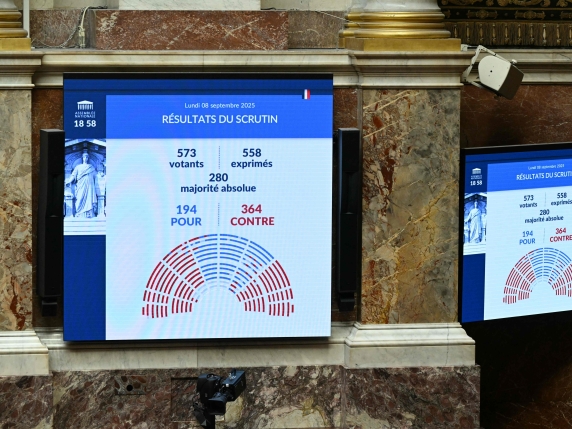
18:30 | 08 September
The vote of confidence begins
With Bayrou's brief response to the group leaders' remarks in Parliament ("A country cannot renounce its sovereignty, nor accept submission to creditors. We are responsible for the future of the French people and of young people"), the debate on the vote of confidence in the government concluded.
MPs were invited to gather in two rooms adjacent to the National Assembly chamber to cast their votes. The procedure will last about half an hour, after which—probably around 7:00 PM—the results will be announced.
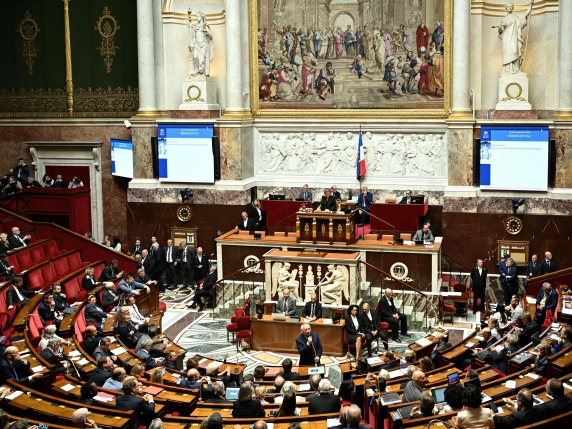
France is in disarray, but the crisis is European
(by Federico Rampini) For some time now, some in America have been gloating over the desolate spectacle offered by France. Several Wall Street Journal headlines in recent days have condensed the subtle enjoyment of American observers, accustomed to hearing rebukes from European academics. France is the new Italy was a recent headline, where the comparison was with the stereotype of Italy having weak and unstable governments. Will France and the United Kingdom need a bailout from the International Monetary Fund? was another headline, an alarming question. Behind this lies the idea that the entire European model, far from being a shining example for the rest of the world, is leaking from all sides.
American manipulation may be irritating, but we must not forget that Washington remains the IMF's largest shareholder, and that the idea of involving this institution in a major bailout for France was launched by none other than a French minister. More generally, the American comments capture at least one element of truth: the troubles of the Fifth Republic under Macron cannot be limited to that country's borders; France's role in the driving force of European integration alongside Germany is well known; in such a challenging time for the Union, France's weakness becomes a problem for everyone.
Mathilde Panot: We don't agree with your diagnosis, much less your remedies.
Mathilde Panot, of the far-left France Unbowed party, says her group is glad it never approved a single one of your budgets.
We don't share your diagnosis, much less your remedies, she says.
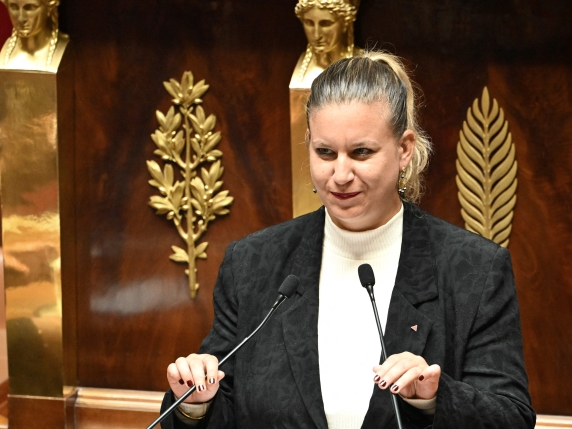
The first to leave power due to a vote of no confidence he himself requested
(by Stefano Montefiori) No government of the Fifth Republic (from 1958 to today) has ever fallen after a vote of no confidence (other than the motion of censure presented by the opposition), mainly because the prime minister usually does not seek a vote of confidence when he only has a relative majority. Predecessors Élisabeth Borne, Gabriel Attal, Michel Barnier, and Bayrou himself did not seek a vote of confidence after their general policy statement when taking office. The last vote of confidence dates back to July 2020, when Macron appointed Jean Castex to Matignon. Bayrou could be the first to leave power due to a vote of no confidence he himself called for.
5.55pm | 08 September
Attal: Indecision poses a threat to the French
Gabriel Attal, who served as Prime Minister between January and September 2024, warns that: Every month of uncertainty or indecision represents a greater threat to the future of the French people.
He adds that forming a government would always entail a political cost, a cost for France, and then lists the practical consequences of failing to approve a budget: including those for the country's defense, the army, and the public sector in general.
Bringing down the government will solve neither the challenges facing France nor the problems of the French people, he concludes.
The former Prime Minister added, after reiterating his disagreement with the abolition of two public holidays: None of the MPs in my group will vote to validate the budget, but the MPs in my group will simply vote for the general interest, for the Stability, to avoid wasting precious time at all costs when we need a budget. If we don't react, if we don't agree on a minimum budget base and very clear measures for the next 18 months, it could be too late.
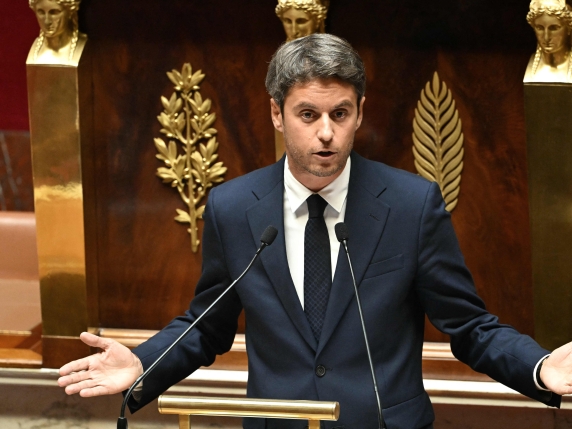
17:41 | 08 September
Marine Le Pen: The debate marks the end of the agony of a phantom government. Dissolving Parliament is a must.
Marine Le Pen attacks the Bayrou government and says that parliament is facing a special political moment, as those responsible are forced to confront the disastrous results of decades of mismanagement, the consequences of which will impact future generations.
She also added that the debate marks the end of the agony of a phantom government, which in her opinion was not governing, but simply administering the country. She then emphasized the need to dissolve the assembly and call early elections: For Macron, the dissolution of the National Assembly is not an option but an obligation.
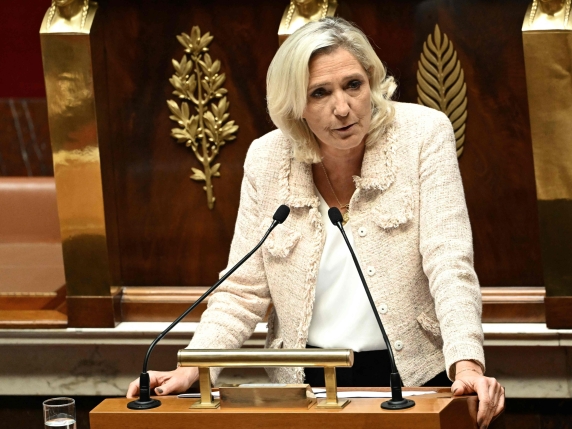
5.31pm | 08 September
Eric Ciotti compares Bayrou to an arsonist firefighter
Eric Ciotti, of the Union of the Right for the Republic, told François Bayrou, taking the podium:"You decided to leave by masking your resignation with a deceptively intelligent communication, which is primarily intended to serve as a springboard for a pseudo-candidacy in the presidential elections." Comparing him to an arsonist firefighter, he added:"Trust is not a sign of irresponsibility, it is a duty. Refusing trust to irresponsible people is an act of courage, first and foremost a political one."
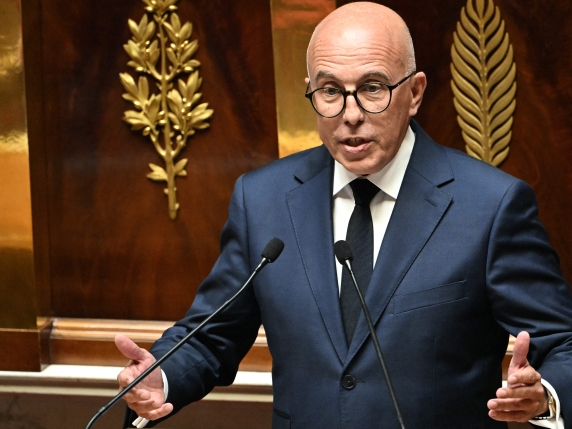
17:18 | 08 September
Media: In case of no-confidence vote, Bayrou will submit his resignation to Macron tomorrow
If French Prime Minister François Bayrou fails to secure the National Assembly's vote of confidence this evening, the most likely scenario, he will submit his resignation to President Emmanuel Macron tomorrow, BfmTv reports, citing informed sources.
17:16 | 08 September
Liot Group: A large majority will not vote for confidence.
Laurent Panifous, Liot's president in the Assembly, assures us that his group has chosen to be a constructive group, committed to proposing solutions. However, it is clear that the method you have chosen has greatly disconcerted us. The vote you are calling for today is not simply an agreement on the facts. In this sense, a large majority of Liot Group members will not give you their confidence.
17:07 | 08 September
Le Pen (Rn): By saying no to the dissolution of the Assembly, Macron is promoting instability.
Marine Le Pen is pushing President Emmanuel Macron to hold new legislative elections. By refusing to dissolve the parliament, he will be promoting instability, claims the leader of the Rassemblement National group on the LCI. But in the event of a new prime minister being appointed soon, Le Pen is setting her own conditions: that taxes not be increased and that savings be made on extremely toxic expenses such as state healthcare.
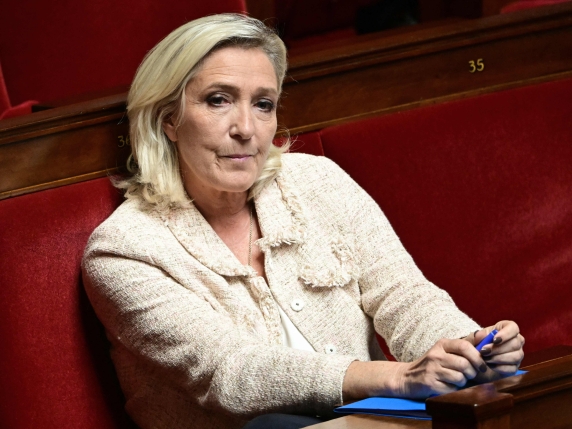
MoDem will support Bayrou. We will vote in favor.
Marc Fesneau, president of the MoDem group, stated: The spiral of debt is rendering our democracy impotent and threatening our sovereignty. The more our debt increases, the more the financial markets will be able to influence our politics.
If everyone tries to prevail over everyone else, then everyone will lose. On the contrary, if everyone accepts the necessary waiver without deviation and transparently before the eyes of the French people, then we will succeed. We will vote in favor of your declaration.
16:56 | 08 September
Tajani: Instability is not good for anyone, I hope for EPP parties
Instability in France is good for no one. It's an important country, a founder of the European Union, and one of Europe's largest economies. Stability is useful to everyone: just as Italy represents a guarantee in Europe thanks to its political stability, an equally important country that is unstable risks causing problems. This was stated by Foreign Minister Antonio Tajani regarding the possible fall of the Bayrou government, speaking on the sidelines of the event"Competitiveness and New Global Challenges: Clean Industrial Deal, Strategic Autonomy, and Tariffs" at the Milan headquarters of Assolombarda.
I hope that extremist parties, neither the far right nor the far left, don't take advantage of this, Tajani adds."You know my political affiliation; I hope that the parties within the European People's Party can recover and return to being protagonists of the France of tomorrow."
Bardella: We will vote against Bayrou; the only way forward is to return to the polls.
With Marine Le Pen, we have reunited the Rassemblement National group in the National Assembly. As announced, we will vote against the confidence motion requested by Prime Minister Francois Bayrou. Emmanuel Macron holds the only solution to get our country out of the political impasse: a return to the polls, wrote Jordan Bardella, president of the Rassemblement National, in a message published on X.
16:41 | 08 September
Cyrielle Chatelain: A Prime Minister from the ranks of the new Popular Front
Cyrielle Chatelain, of the Greens: To break the impasse, the President has no choice but to accept cohabitation and appoint a Prime Minister from the ranks of the new Popular Front. Not to change face, but to change course. When a left-wing government cannot and must not be the lifesaver of Macron's policy. Dialogue, compromise always, never.
And she then added: Beyrou's departure is a relief. It would almost be satisfying, if it weren't accompanied by concern for what will come next. After the premature end of the Attal government, the censure of Michel Barnier, and the failure of your government, logic would dictate that things would finally change.
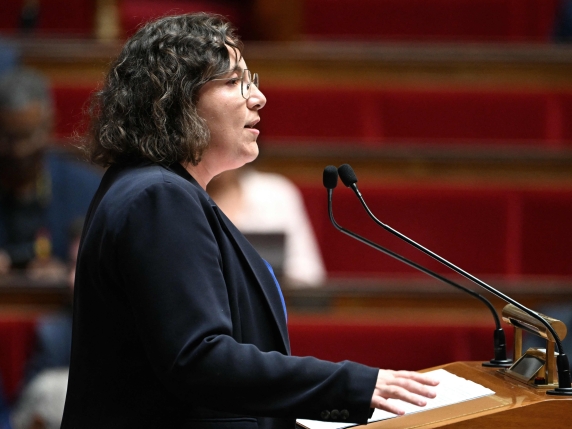
16:31 | 08 September
Wauquiez: Bayrou will not have full support from Les Républicains
If she had listened to the France that works, she would have the full support of the Les Républicains deputies. The leader of the Les Républicains group stated this in his address to the National Assembly, confirming that some of his group's deputies will vote against the vote of confidence or abstain. For Wauquiez, La France Insoumise is the main political threat to France.
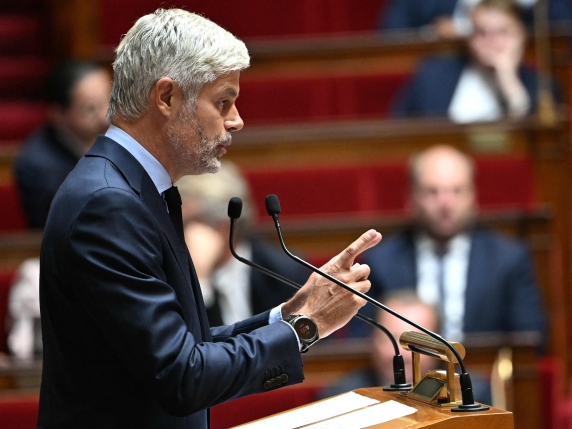
16:23 | 08 September
Bayrou: France hasn't had a balanced budget in 51 years. We're in mortal danger.
France hasn't had a balanced budget for 51 years. French Prime Minister François Bayrou emphasized this, speaking to the National Assembly in extraordinary session for a vote of confidence on the budget law. We spend without ever looking back, he lamented, before warning:"Our lives are in danger."
16:20 | 08 September
The Socialists: By voting no confidence, we demonstrate that we are ready to govern.
By voting no confidence today, the Socialists are taking responsibility for affirming their readiness, alongside the left and the ecologists, to govern: said PS MP Boris Vallaud, the first to speak in the National Assembly after FranÇois Bayrou's speech. Our choices are not yours—said Vallaud—but those of the French people. No to work, yes to capital. No to public holidays, yes to inheritances. No to small and medium-sized businesses, yes to multinationals. We propose a different path, that of people who refuse to give up and look beyond their chains.
16:17 | 08 September
Political forces announcing a vote of no confidence are preparing chaos
The political forces that are announcing that they will bring down the government are opposed to each other and incompatible both in their ideas and in their ulterior motives and if their logic of division prevails they are preparing chaos and disorder in which everyone shouts in their own corner and from which nothing good can come.
16:08 | 08 September
Young people feel like a sacrificed generation
I was struck by how young people feel like a sacrificed generation and say, 'We won't have any pensions,' the French prime minister added. Oh, I know very well that you would like the burdens on their shoulders to increase even further. Well, we believe exactly the opposite. We think we need to lighten them," he said, interrupted this time by applause,"so that they are freed from the slavery into which we are sinking them. And speaking of young people, he also said: 'Don't say you love young people, that you care for them, if you pretend to ignore the crushing weight of the debt accumulated on their shoulders.'
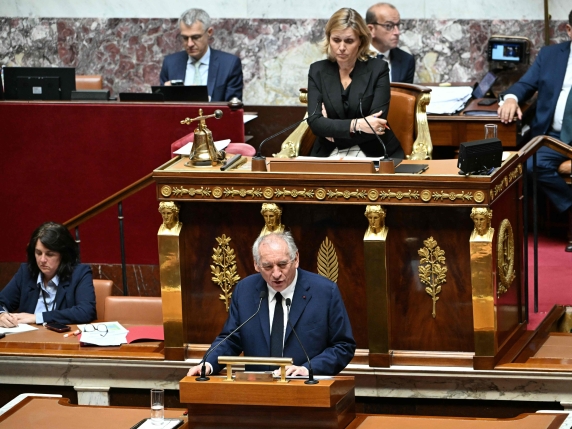
16:02 | 08 September
Debt subjugates like weapons, we lose our freedom
Subjugation to debt is like submission to military force: subjugated by weapons or creditors, in both cases we lose our freedom, Bayrou added. The prime minister then called for a reassessment of the inexorable tide of debt engulfing France. He then proposed a plan to bring the deficit back to 3% of GDP by 2029.
16:01 | 08 September
Why France is on the brink of bankruptcy: debt, political crisis, spread, what's happening
(by Massimo Nava)As in Aesop's fable, no one believes those who cry wolf, but in the end the wolf comes and holds a king's feast. A cruel parable in the Europe of grasshoppers and ants, of virtuous countries and wasteful countries. Ireland, Greece, Portugal, and Italy have been taught public finance lessons, but now it's France's turn to play the dishonorable role of the sick man of Europe. A role assigned by an out-of-control public debt and a political crisis with no way out and therefore unable to find solutions. Furthermore, the French situation risks causing a domino effect on European markets at a time when the EU needs stability and initiative more than ever in the face of major challenges: the trade war, the conflict in Ukraine, the complicated relationship with the US, and the aggressive BRICS axis. The trigger for the French crisis will be the vote of confidence in the National Assembly, scheduled for September 8. Prime Minister François Bayrou is playing his last cards with little hope to push through financial measures that should allow for spending cuts of around €44 billion. These measures are opposed by both the right and the left. A barrage of fire that is increasingly isolating President Emmanuel Macron, eroding his already small parliamentary membership, and could lead to early elections for the second time in a few months, without excluding the president's resignation.
The Prime Minister lists the problems that he believes are weighing down France
The prime minister listed the problems that, in his view, weigh down France: the country's declining production since 2000; an education problem that struggles to educate young people and with schools that fail to guarantee equal opportunities for all; a housing crisis; a climate emergency; security; migration and integration; the imbalance between large cities and rural wastelands; and a question of life in the French Overseas Territories. France, he said, is a magnificent cathedral in need of rebuilding. All these issues are now contingent on our ability to control our spending and over-indebtedness.
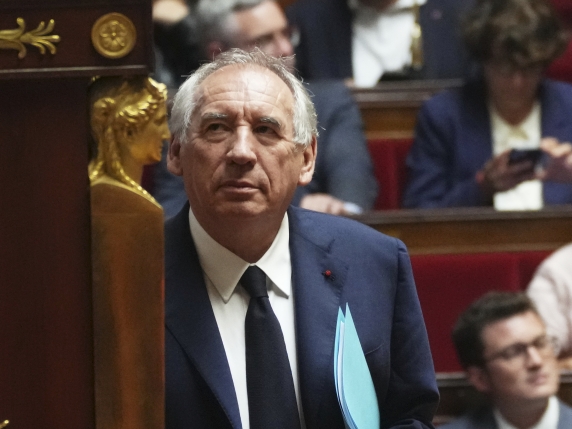
3.58pm | 08 September
Debt reduction is a vital urgency for France
Debt reduction is a matter of vital urgency for France: this was the warning issued by the French Prime Minister. Speaking to parliamentarians, he highlighted the colossal debt burdening the eurozone's second-largest economy and the vital urgency of restoring the country's public finances.
François Bayrou and the confidence gamble. The"kamikaze" prime minister gambles everything.
(by Stefano Montefiori) Tomorrow around 7pm François Bayrou will most likely conclude his brief experience as the oldest prime minister (74 years old) of the Fifth Republic. An adventure that had just begun, last December 13th: that Friday at dawn, the old centrist rushed boldly to Emmanuel Macron's office at the Elysée, certain of receiving an appointment that seemed to him due, obvious, even belated.
After all, he was the one who had fought all his life against the two pillars of the right and the left, and if the young Macron in 2017 had managed to make them collapse, becoming a Bayrou who succeeded, part of the credit also went to his older ally, who never failed to provide him with political support and the votes of the centrist deputies in the National Assembly.
That morning, however, the professor of classics and biographer of Henry IV, lover of horses and poet of provincial life, married since 1971 to Élisabeth Perlant, met on the university benches, six children and 21 His nephews, mayor of Pau in the Pyrenees and a marathon runner through the Parisian corridors, with the good-natured face of a primary school teacher but also (on his best days) a shrewd weaver of alliances and maneuvers, were asked to be the number two in a government led by others (Lescure or Lecornu).
What a humiliation. After a momentous argument with the president, and the threat of withdrawing the support of the MoDem party, Bayrou snatched the nomination at lunchtime. But the very fact that Macron was reluctant to grant it to him, and that he hadn't suspected it, says something about Bayrou's (relative) grip on reality.
Bayrou: You can overthrow the government but you can't erase reality.
Ladies and gentlemen of Parliament, you have the power to overthrow the government, but you do not have the power to erase reality. Reality will remain inexorable, spending will continue to increase, and the debt burden, already unsustainable, will become increasingly burdensome and costly, he added, appealing to the personal conscience of each Member.
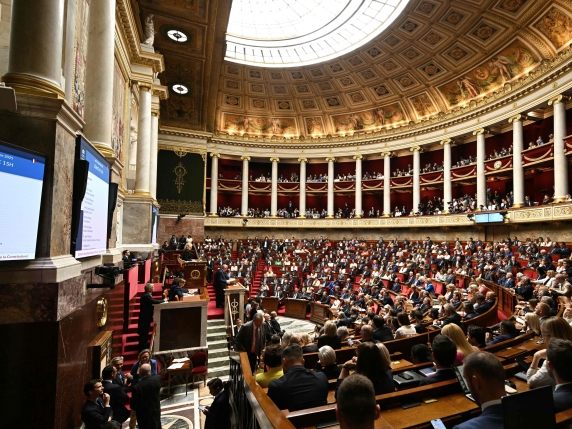
3.47pm | 08 September
Bayrou in Parliament: I wanted this proof
French Prime Minister Bayrou addressed the National Assembly for the eagerly awaited vote of confidence. Amidst a loud buzz and a marked hoarseness, he began:"I wanted this test; the greatest risk would have been not to take the risk."
3.46pm | 08 September
France, today's vote of confidence for Bayrou: the French government is headed for collapse. Here's what could happen (even to Macron)
(by Stefano Montefiori) Around 7 pm this evening, French MPs will vote on whether or not to give their confidence to Prime Minister François Bayrou, who most likely will not obtain it. The French government appears destined to fall, and the first to be convinced of this seems to be Bayrou himself, who has called his ministers together for a convivial occasion at 8:30 pm for a farewell toast. It was the Prime Minister himself, at the end of August, who decided to request the 42nd vote of confidence of the Fifth Republic, a choice that took everyone by surprise given that he does not have a majority in the Assembly. He therefore exposed himself to the risk, which has now become almost a certainty, of being rejected. I will put the government's responsibility at stake on a declaration of general policy pursuant to Article 49, paragraph 1, of our Constitution, Bayrou announced on Monday, August 25. This general policy statement will aim to explicitly raise the central question of whether or not there is a grave danger for the nation, whether or not there is urgency, and to choose the path that will allow us to escape this debt curse by regaining control of our finances, explained the 74-year-old prime minister, who is proposing a €44 billion savings plan to restore France's public finances.
The centrist Bayrou
hoped to strengthen himself ahead of the presentation of the budget law in October
, confident in the support or at least abstention of a large part of the political forces, particularly the
Rassemblement National and the non-radical left as well as the Central Bloc. But Marine Le Pen and Socialist secretary Olivier Faure immediately announced that they would vote against. Thus Bayrou's move turned out to be an own goal, with very serious consequences. At 3:00 PM, Bayrou will take the floor of the National Assembly for the general policy statement
, which will focus on the state of public finances. Each political group will then send its spokesperson to respond, for example, Boris Vallaud for the Socialists, Marine Le Pen for the
Rassemblement National, former Prime Minister Gabriel Attal for the Macronists. The prime minister, who unlike the parliamentarians will have no time limit, will then be able to answer their questions. The deputies will retreat for thirty minutes to the rooms next to the hemicycle, after which the vote will take place. The outcome should be known around 7:00 PM or later, depending on the length of the speeches, particularly those of Bayrou. In recent months, Bayrou, prime minister since December 13
, has overcome several motions of censure presented by his opponents, but to be approved, those required an absolute majority of the Assembly (usually 289 votes under normal conditions, 288 today due to a vacant seat). The vote of confidence will instead be based on the majority of votes cast.
The prime minister can count on a maximum of 210 votes in his favor, compared to approximately 350 from the opposition groups. If the Assembly, as is more than likely, withholds its confidence, the prime minister must submit the government's resignation to the President of the Republic (Article 50 of the Constitution). When his predecessor, Michel Barnier, was defeated in the National Assembly on December 4, he submitted his resignation to President Macron the following morning. No government of the Fifth Republic (from 1958 to today) has ever fallen after a vote of no confidence
(other than a motion of censure presented by the opposition), mainly because the prime minister usually does not seek a vote of confidence when he only has a relative majority. Predecessors Élisabeth Borne, Gabriel Attal, Michel Barnier, and Bayrou himself did not seek a vote of confidence after their general policy statement upon taking office. The last vote of confidence dates back to July 2020, when Macron appointed Jean Castex to Matignon.
Bayrou could be the first to leave power due to a vote of no confidence he himself called for. What will happen next? President Macron could appoint a new prime minister who offers greater guarantees of gaining the support of political forces, seeking to broaden the center-left majority: for this reason, the names of the Socialist Pierre Moscovici, current president of the Court of Auditors, or even Eric Lombard, currently Minister of Economy, considered close to the left and capable of collaborating with the center-right, are being floated. Macron could instead focus on a name from the right, perhaps Gérald Darmanin, the current Minister of Justice. But much will depend on the attitude of the Rassemblement national, which has hardened its position and now, like Jean-Luc Mélenchon's France insoumise (radical left), is calling for another vote. Not only to elect a new National Assembly, but also a new President of the Republic following the loud calls for Macron's resignation. The head of state has repeatedly declared that he will not resign
and that he intends to remain at the Elysée until the end of his (second) mandate, in spring 2027. But if the political stalemate were to continue and France's financial situation worsens,
Macron could be forced to change his mind.

